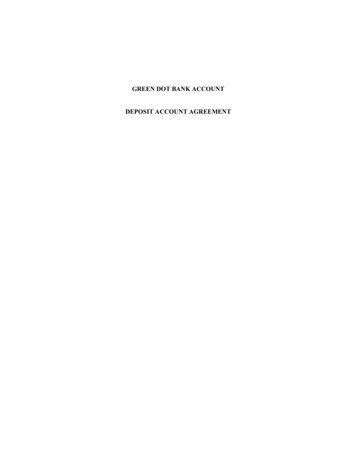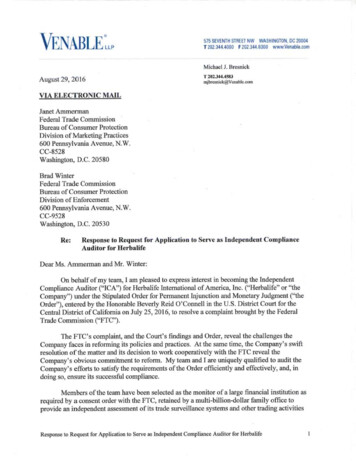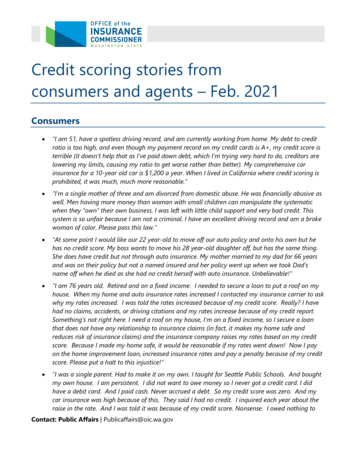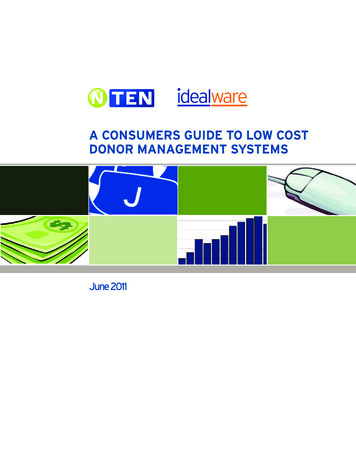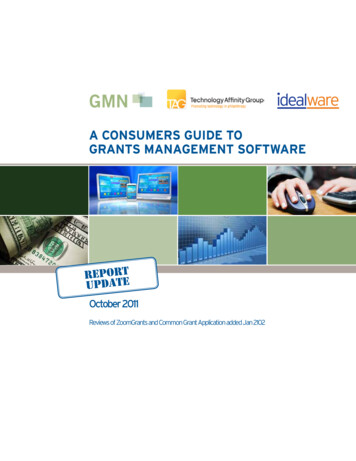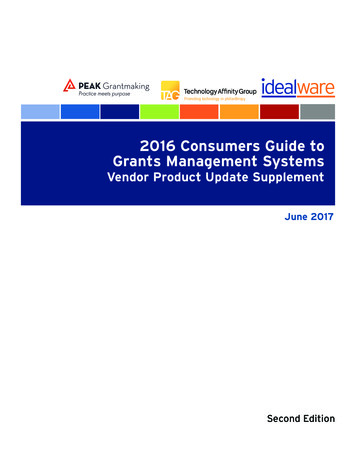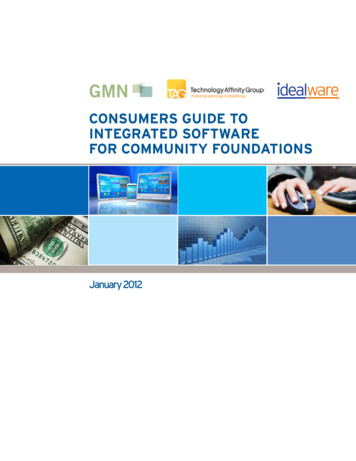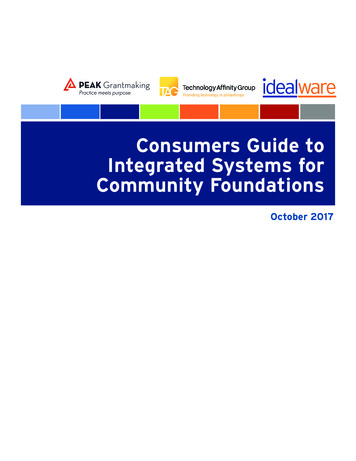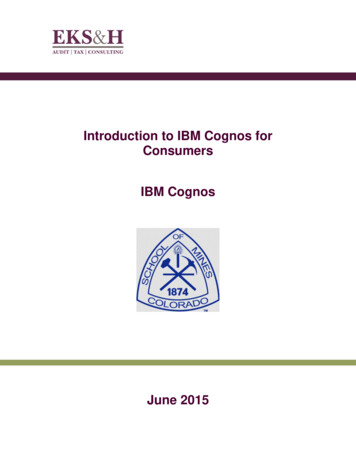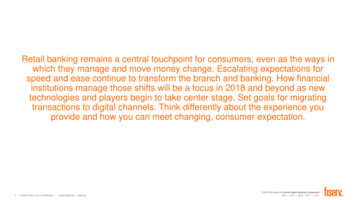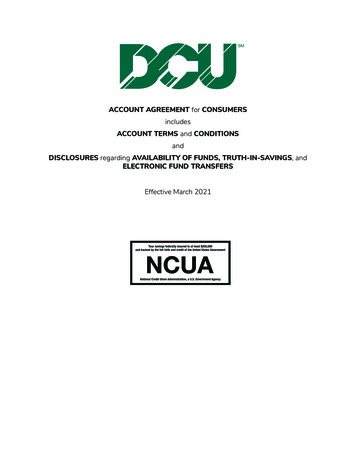
Transcription
ACCOUNT AGREEMENT for CONSUMERSincludesACCOUNT TERMS and CONDITIONSandDISCLOSURES regarding AVAILABILITY OF FUNDS, TRUTH-IN-SAVINGS, andELECTRONIC FUND TRANSFERSEffective March 2021
Welcome.This document contains DCU’s Account Agreement for consumers, which includes the terms, conditions,and disclosures that apply to DCU’s consumer Share Accounts and Account-related services. We hope theinformation in this Account Agreement will help you to understand the features of your DCU Accounts. If youhave any questions, however, a DCU representative will be happy to help you. Just contact us in any of theways listed under “Contact Us”.Throughout this Account Agreement, the terms “we,” “us,” “our,” and “DCU” refer to Digital Federal CreditUnion. “You” and “your” refer to each Accountholder or, in the case of an optional service, to each person whorequests or uses the service.This Account Agreement does not apply to Share Accounts held for business purposes. Please see ourseparate Business Account Agreement for information regarding business accounts.ARBITRATION, CLASS ACTION WAIVER, AND JURY TRIAL WAIVER – THIS ACCOUNT AGREEMENTCONTAINS AN ARBITRATION CLAUSE, A CLASS ACTION WAIVER, AND A JURY TRIAL WAIVER. IT ISIMPORTANT THAT YOU READ THOSE CLAUSES CAREFULLY BEFORE CONSENTING TO THIS ACCOUNTAGREEMENT. They are in Part III of this Account Agreement.Contact UsIf you have questions regarding your Accounts (including questions regarding transactions or chargesappearing on your statement, billing error inquiries, stop payment orders, or reports of lost or stolen checks,cards, PINs, or Passcodes), you may contact us using any of the methods below.Call our Information Center at:800.328.8797Hours of operation:Weekdays from 8:00am to 9:00pm andSaturdays from 9:00am to 3:00pmOur Information Center is not staffed onSundays or holidays observed by DCUEmail us at:dcu@dcu.orgChat with us at:dcu.orgWrite to us at:Digital Federal Credit Union220 Donald Lynch BoulevardP.O. Box 9130Marlborough, Massachusetts 01752-9130Attention: Account ServicesLog in to Online Banking:use the “Secure Email” linkunder “Contact Us”Note: Email sent through the “Email DCU” link inside Online Bankingwill be encrypted to protect your personal information. Messagessent through our public website Email/Feedback Contact Form are notencrypted, so you should not use that form to send Account numbers orother personal information.Notice Regarding Confidential Information: We will never ask you to give us confidential information (such as your log-in credentials, accountnumber, or Social Security Number) in a telephone call that we initiated, and we will not ask you to send such information to us via email. If youreceive any such request, DO NOT respond to it and notify us immediately. We may request confidential information in order to establish ormaintain financial services offered by DCU, but we will do so only through secure contact forms or protected online applications.2
ContentsContact Us InformationI.II.III.General Information1.2.3.4.5.6.Scope of Account AgreementMembership at DCUField of MembershipExpress Consent for Telephone Calls and Call RecordingLimitation of ServicesOther 34.35.36.37.38.Opening Your AccountAccount FreezeJoint AccountsTotten (Payable-On-Death)Custodial AccountsChecking Account e LegendsNo Two-Signature Requirements on AccountsLimitations on Withdrawals from Savings and Money Market AccountsPostingStop Payment OrdersLegal Actions Affecting Your AccountsFeesStatementsInsuranceTransferability of AccountCollectionSet-Off and Lien on SharesStandard of CareSecurity ProceduresLimitation of LiabilitySafeguarding Your ChecksFacsimile SignaturesWaiverInvalid ProvisionsReporting InformationAbandoned PropertyForeign Items and Foreign CurrencyClosing Your Account or Terminating ServicesSuspension of ServicesAmendmentsNoticesAccountholder Contact InformationApplicable LawEvidence1.2.ClaimsSmall Claims CourtRules for Share 999999991010101010101010101111111111113
ContentsIV.V.3.4.5.6.7.8.9.Applicable Rules and ProceduresCosts and ExpensesInitiating ArbitrationApplicable LawDecision and Right of AppealRight to Opt Out of ArbitrationWaiver of Trial by Jury and Participation in Class Actions1.2.3.4.5.6.7.How DCU Determines That An Overdraft OccurredAutomatic Transfers from SavingsOverdraft Protection (Overdraft Line of Credit Available by Prior Arrangement)Overdraft Payment ServiceOrder of Overdraft WithdrawalInsufficient Current BalanceAvoiding Overdrafts1.2.3.4.Important Information Relating To Your Share Draft AccountWhat is a substitute check?What are my rights regarding substitute checks?How do I make a claim for a refund?1.2.3.4.5.6.7.8.9.10.Your Ability to Withdraw FundsDetermining the Availability of a DepositSame-Day AvailabilitySecond-Day AvailabilityFourth-Day AvailabilityLonger Delays May ApplyDeposits at Nonproprietary ATMsHolds on Other Funds for Check CashingForeign ChecksSpecial Provisions for New Accounts1.2.3.4.5.6.7.8.Annual Percentage Yield (APY) And Dividend RateWhen Dividends Begin to AccrueCompounding and CreditingMinimum Deposit and Balance RequirementsBalance Computation MethodFeesTransaction LimitationsSpecial Rules for Term Accounts (including all Certificates and Certificate IRAs)1.2.3.4.5.6.7.Electronic Check ConversionTelephone BankingElectronic Deposits and Preauthorized TransfersATM and Debit CardsGeneral Provisions Applicable to All Electronic Fund TransfersIn Case of Errors or Questions About Your Electronic TransfersIn Case of Errors or Questions About Foreign Electronic Fund (Remittance) TransfersOverdraftsSubstitute Checks and Your RightsVI. Availability of Funds and Collection of ChecksVII. Truth in Savings DisclosuresVIII. Electronic Fund 9202223244
I. General Information1. Scope of Account Agreement – This Account Agreement governs all DCU Checking Accounts, Savings Accounts (includingMoney Market Accounts), Share Certificate Accounts, Share Retirement (IRA) Certificate Accounts, and other DCU ShareAccounts opened for personal, family, or household purposes.2. Membership at DCU – All primary accountholders must be DCU members. To be eligible to join DCU, you must be withinDCU’s field of membership (as described below). You must also be a citizen or legal resident of the United States, reside inthe United States, and have a valid Tax Identification Number. All members must maintain a Primary Savings Account with abalance at least equal to the par value of one share in DCU. (The current par value of a share is 5.00.) If the balance of yourPrimary Savings Account falls below the value of one share, we may transfer the difference from any other DCU Account heldin your name (individually or jointly). If there is no other Account from which to make a transfer, we may close your Account andterminate your membership. We will give you any notice required by law. So long as an Account is held in the name of a primaryaccountholder who is a DCU member, it may also include secondary accountholders or Account signatories who are not DCUmembers.3. Field of Membership – Credit unions are formed to provide financial services to persons who share specific common bonds.The common bonds for which a credit union is approved make up its “field of membership.” DCU’s field of membership includespersons who: (1) live, work, worship, or attend school in one of the communities in DCU’s field of membership; (2) are spouses,domestic partners, children, grandchildren, parents, grandparents, or siblings (including adoptive, in-law, and step relationships)of a current DCU member or of a non-member who is eligible for membership as described in this paragraph; or (3) work for,belong to, or have retired from one of the participating companies, organizations, or associations in DCU’s field of membership.The current list of participating companies, organizations, associations, and communities is available on our website (search “JoinDCU”) or by contacting us in any of the ways listed under “Contact Us”. Membership will not be affected if an existing member nolonger meets the field of membership requirements outlined above.4. Express Consent for Telephone Calls and Call Recordinga.Express Consent – Any time you provide us with a telephone number (including for a landline, cellular, Voice over InternetProtocol (VoIP), or any other form of telephone device), you are expressly consenting that we may use that number to contactyou and that we may allow service providers who assist us in providing account services to you to use that number to contactyou. We may contact you by any method, including voice call, call using any automated dialer technology, artificial and/orprerecorded voice call, texts, and other methods, even if you may incur charges from your phone provider when we do. Wemay contact you about any Account or service you have with us (such as with a fraud alert for a credit or debit card or apayment due notice for a loan or other credit account).b.Revoking Consent – You may revoke your consent to be contacted by DCU and its service providers using automated dialertechnology or artificial and/or prerecorded voice at the telephone number you provided by contacting us in any of the wayslisted under “Contact Us”.IMPORTANT: Some DCU services can be offered only if we have permission to call or text you. We may choose toclose your Account or terminate individual services if we do not have a current number at which we are authorized tocontact you.c.Call Recording – DCU may monitor or record telephone calls for security reasons, to maintain a record, and to ensure thatyou receive courteous and efficient service. You expressly consent to any such recording. We do not have to remind you ofour recording before each telephone conversation.5. Limitation of Services – DCU may suspend or terminate services to a member or other person who is not in good standingwith DCU. Suspension or termination may affect access to any DCU services, facilities, and personnel, except for a member’sright to maintain a share account and to vote at annual and special meetings. A person is considered to be “not in good standing”if such person: (1) fails to comply with the terms and conditions of any obligation to DCU; (2) causes a loss or expense to DCU;(3) manipulates, engages in fraud, or otherwise abuses DCU’s services; or (4) engages in abusive behavior or injures any personor damages any property while on DCU’s premises or at any DCU function. A determination whether a person is not in goodstanding will be made at DCU’s sole discretion. For a more detailed explanation, see DCU’s Limitation of Services Disclosure.6. Other Agreements – Your use of the services, products, and features associated with your Account(s) will be subject toapplicable law and to DCU’s practices, policies, and applicable service agreements, such as DCU’s Privacy Policy, OverdraftPayment Service Disclosure, Schedule of Fees and Service Charges, and Online and Mobile Banking Agreement.5
II. Rules for Share Accounts1. Opening Your Account – You can open a DCU Share Account online, in person at any DCU branch, or through any otherchannel we make available. When you open an Account, you agree to be bound by this Account Agreement. You should retain acopy of this Account Agreement and all amendments for your records.Important Information About Procedures for Opening a New AccountTo help the government fight the funding of terrorism and money laundering activities, Federal law requires all financial institutionsto obtain, verify, and record information that identifies each person who opens an Account.What this means for you: When you open a DCU membership, we will ask for your name, address, date of birth, and otherinformation that will allow us to identify you. We may also ask to see your driver’s license or other identifying documents andobtain certifications of valid tax identification or employer identification numbers. If we do not receive the required documentationor certifications for your Account, we may refuse to open your Account and/or close any opened Account and return the funds tothe person who opened the Account at the address provided when the Account was opened.2. Account Freeze – If DCU suspects any irregular, unlawful, unauthorized, fraudulent, or otherwise improper activity involvingyour Account(s), DCU may place a hold on any and all of your Accounts (“Freeze”) pending an investigation of the suspectedactivities. Improper activity includes, without limitation, kiting and repeated patterns of transactions that have no apparentbusiness reason other than to take advantage of hold periods for funds availability and/or “interest float” to DCU’s detriment. IfDCU places a Freeze on your Account(s), DCU will provide to you any notice required by law. We may give notice after a Freezeis placed; for instance, if we suspect fraudulent activity, we may immediately place a Freeze on your Account(s) and then give younotice.3. Joint Accountsa.Joint Accountholder Activity – If your Account has more than one owner on it, we will treat it as a joint Account. Eachjoint accountholder may withdraw any or all of the funds in the Account. Each joint accountholder can also make deposits,close the Account (except for the Primary Savings Account), request services relating to the Account, and stop payment ofany check. If DCU is notified of a conflict between the accountholders with respect to the Account, we may place aFreeze on the Account until we receive a court order or transaction directions signed by all accountholders. In oursole discretion, we may require you to: (i) sign an indemnification agreement and/or to post a bond satisfactory to us that willprotect us for following your instructions; or (ii) provide a court order or other legal document authorizing DCU to follow yourinstructions.b.Agency between Accountholders – Each joint accountholder guarantees the signatures of the other joint accountholders,and authorizes them to endorse items payable to him or her individually or jointly and to cash items or deposit them. We cannotify one accountholder and the notice will be effective for all accountholders. One accountholder can notify DCU and we willconsider it to be notice from all accountholders. If one accountholder dies, the surviving accountholder(s) will automaticallybecome the sole owner(s) of the Account. Each joint accountholder hereby appoints the other accountholder(s) as his or heragent(s) for the purpose of requesting services relating to the Account (such as ATM or Debit Cards, discretionary overdraftprotection, Online Banking, Bill Payment, external transfers, and telephone access).c.Fiduciary Accounts – If you deposit money in your name as trustee, custodian, guardian, executor, or administrator forthe benefit of someone else, you have the sole right to make withdrawals and other decisions regarding the Account. DCUdoes not offer Accounts on which two (2) or more signatures are required. Therefore, if there are two or more trustees orexecutors for the Account, each is authorized to act individually. If you opened a membership as a Totten Trust/Payable onDeath Account, then the beneficiary is entitled to receive the funds after the death of the last surviving Totten membershipAccountholder. For all other types of fiduciary accounts, a successor trustee, custodian, guardian, executor, or administratormust be appointed as provided under applicable law. You or the beneficiary or successor is responsible for providing DCUwith all documentation required by law.4. Totten (Payable-On-Death) – DCU may permit you to designate your membership (and all Accounts under the membership)as a Totten (Payable-On-Death) membership, and to name beneficiaries to receive funds in the membership after the death of allTotten membership Accountholders. DCU may permit additional Accountholders (also called “Co-Trustees”) to be added to theTotten membership. You are solely responsible for complying with any applicable legal requirements, including, without limitation,any requirements regarding account titling, related to the Totten membership. Beneficiary designations may be changed by anyof the Accountholders, and beneficiaries have no interest in the Accounts under the Totten membership until the death of the lastAccountholder. When the last Accountholder dies, DCU may pay the funds in all Accounts under the Totten membership to thesurviving beneficiaries, subject to DCU’s right of offset/lien on shares for any amounts owed to DCU. If more than one beneficiaryis surviving at the time of distribution, DCU shall distribute the funds in the entire Totten membership to the surviving beneficiariesin equal shares.5. Custodial Accounts – DCU may permit you to open an Account as custodian for the minor named on the application formunder the Uniform Transfers to Minors Act (UTMA). The transfer of money to the minor named on the application form, whichwill include all dividends and any future additions, is irrevocable and is made in accordance with the UMTA, as amended. Youacknowledge that by signing the application form, you have received the funds in the Account as custodian for the designated6
minor. You understand that it is your sole responsibility as custodian to transfer ownership of the funds to the minor at theappropriate time. The successor custodian named on the application form shall serve if you should be unable to act as custodianbecause you resign, die, or become legally incapacitated.6. Checking Account Sub-Accounts – All Checking Accounts consist of two (2) sub-accounts: a transaction sub-account anda savings sub-account. The separation of the two (2) sub-accounts is for internal purposes only, will not appear on your periodicstatement, and does not affect the use of your Checking Account in any way. All account rules, regulations, and disclosures(including any provisions relating to dividends) apply to your Checking Account as a whole, without reference to the sub-accounts.All transactions that you perform will be posted to your transaction sub-account. DCU may, at its sole discretion, use the savingssub-account as a holding account for funds that exceed the amount needed to satisfy the checks, electronic fund transfers, andother debits that we estimate will be posted to your Checking Account. We will transfer funds from the savings sub-accountback to the transaction sub-account periodically as needed to pay transactions posted to your Checking Account. If we make six(6) transfers from the savings sub-account to the transaction sub-account in any one statement period, we will transfer all fundsto the transaction sub-account at the time of the sixth (6th) transfer. Use of the savings sub-account as a holding account mayresume at the beginning of the next statement period.7. Dividends – DCU pays dividends on the funds in all Accounts listed in our Rates sheet from the date of deposit to the date ofwithdrawal (or maturity, in the case of Certificate Accounts). If you close any Account, other than a Certificate Account, beforedividends are credited, accrued dividends for the month will not be posted to the Account or paid. Dividends rates, which aredetermined by DCU’s Board of Directors from time to time, can change after account opening on any Account except a CertificateAccount. For more information about compounding and crediting dividends, see Part VII (Truth in Savings Disclosures) of thisAccount Agreement.8. Depositsa.Deposit Credit – All items deposited in an Account are received for collection and are credited subject to final payment.b.Uncollectible Items – If a cashed or deposited
1. Scope of Account Agreement 5 2. Membership at DCU 5 3. Field of Membership 5 4. Express Consent for Telephone Calls and Call Recording 5 5. Limitation of Services 5 6. Other Agreements 5 II. Rules for Share Accounts 6 1. Opening Your Account 6 2. Account Freeze 6 3. Joint Accounts 6 4. Totten (Payable-On-Death) 6 5. Custodial Accounts 6 6 .
